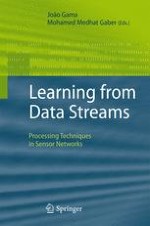2007 | OriginalPaper | Buchkapitel
Knowledge Discovery from Sensor Data For Scientific Applications
verfasst von : Auroop R. Ganguly, Olufemi A. Omitaomu, Yi Fang, Shiraj Khan, Budhendra L. Bhaduri
Erschienen in: Learning from Data Streams
Verlag: Springer Berlin Heidelberg
Aktivieren Sie unsere intelligente Suche, um passende Fachinhalte oder Patente zu finden.
Wählen Sie Textabschnitte aus um mit Künstlicher Intelligenz passenden Patente zu finden. powered by
Markieren Sie Textabschnitte, um KI-gestützt weitere passende Inhalte zu finden. powered by
The current advances in sensors and sensor infrastructures offer new opportunities for monitoring the operations and conditions of man-made and natural environments. The ability to generate insights or new knowledge from sensor data is critical for many high-priority scientific applications especially weather, climate, and associated natural hazards. One example is sensor-based early warning systems for geophysical extremes such as tsunamis or extreme rainfall, which can help preempt disaster damage. Indeed, the loss of life during the 2004 Indian Ocean tsunami may have been significantly reduced, if not totally prevented, had sensor-based early warning systems been in place. One other example is high-resolution risk-mapping of insights obtained through a combination of historical and real-time sensor data, with physics-based computer simulations. Weather, climate and associated natural hazards have established history of using sensor data, such as data from DOPPLER radars. Recent advances in sensor technology and computational strengths have created a need for new approaches to analyzing data associated with weather, climate, and associated natural hazards. Knowledge discovery offers tools for extracting new, useful and hidden insights from data repositories. However, knowledge discovery techniques need to be geared towards scalable and efficient implementations of predictive insights, online or fast real-time analysis of incremental information, and solution processes for strategic and tactical decisions. Predictive insights regarding weather, climate and associated natural hazards may require models of rare, anomalous and extreme events, nonlinear phenomena, and change analysis, in particular from massive volumes of dynamic data streams. On the other hand, historical data may also be noisy and incomplete, thus robust tools need to be developed for these situations. This chapter describes some of the research challenges of knowledge discovery from sensor data for weather, climate and associated natural hazard applications and summarizes our approach towards addressing these challenges.
